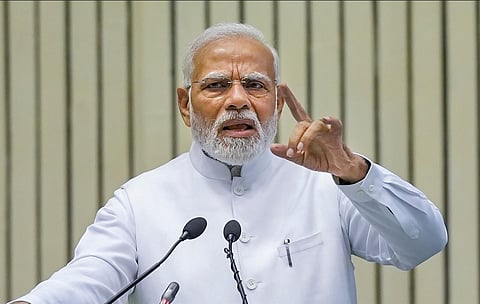

There have been few political leaders who have enjoyed full public trust. Prime Minister Narendra Modi is one of them. Having crafted Indian diplomacy to serve the national interests, his visit to the US shows the arrival of India on the global stage. PM Modi summed up his vision for India’s foreign policy in 2014: “Naa aankh jhukaunga, naa aankh dikhaunga; aankh se aankh mila kar baat karunga (neither will I lower my eyes, nor stare; I will look into eyes and talk).” In his tenure so far, he has ensured that India is counted as an equal by the world powers.
In Indian political history, only two Prime Ministers—Lal Bahadur Shastri and Atal Bihari Vajpayee— enjoyed such public support. People responded with zeal and vigour to Shastri’s call of ‘Jai Jawan, Jai Kisan’; this was the time when the country faced external threats and also fought internal war against hunger. Vajpayee announced the arrival of India on the global stage by conducting nuclear tests in 1998. When India faced Western sanctions for it, the former PM called upon the NRIs to help the country. They responded by depositing more than Rs 50,000 crore in various schemes. The Indian diaspora did so because they believed that Vajpayee was pursuing the path of ‘reform, perform and transform’. PM Modi is in the league of Shastri and Vajpayee.
During the 2002 SAARC Summit, former Pakistani President Pervez Musharraf extended the hand of friendship to Vajpayee, who quickly said such gestures should be matched with action on ground. Modi, in 2015, on his return from Afghanistan, made a surprise stopover in Islamabad to meet his counterpart Nawaz Sharif. Earlier he had also invited SAARC leaders to his swearing-in ceremony in 2014, showing his intent to work with neighbours.
The world powers measure the strength of the leadership. They had seen Manmohan Singh allowing the insertion of Balochistan in Sharm el-Sheikh in a joint statement with Pakistani leadership. Such self-goal did not go unnoticed. The gains made by Vajpayee were squandered during the 10 years of UPA rule. Modi picked the thread once more in 2014 and began working from where Vajpayee had left. The Western nations took note of the fact that he has a decisive leadership and enjoys full public support. With the surgical strike, Modi showed that when you take action on the basis of empirical evidence and databases, the leadership of the country gets the strength to stand up to the superpowers. The US and other nations saw the repeat of the Modi doctrine in the Galwan clash of 2020 in eastern Ladakh.
The perception about India has changed. The West has started acknowledging that the nation can no longer be held back. Modi won friends all over the world because he showed that the country was not an aggressor, but was capable enough to defend. India raises its voice against terrorism, hunger, climate change, developmental inequities and gender discrimination. Its partnership with small island nations such as Sri Lanka and the Maldives is a template for good relations. It stands for the poor—when half the population of Afghanistan was starving last year, the country sent wheat and medicines. India is now indispensable for the global order, which aims to work for the well-being of humanity.
(Author is Director, Public Policy Research Centre; he tweets at @BhasinSumeet)